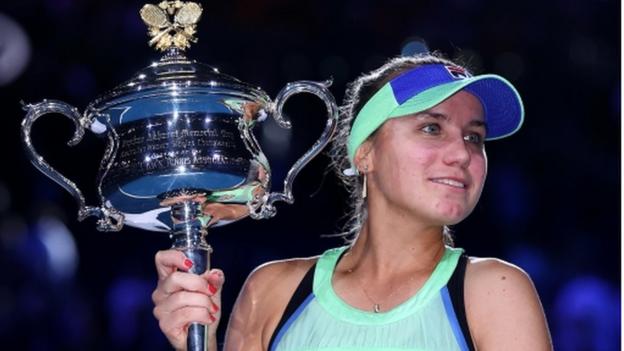
American Sofia Kenin fulfilled her potential by winning a first Grand Slam title with victory over Spain's Garbine Muguruza at the Australian Open.
Kenin won 4-6 6-2 6-2 against two-time major winner Muguruza in Melbourne.
The 21-year-old was a child prodigy, who started making television appearances from the age of five and hitting with the stars soon after.
"My dream has officially come true," said Kenin, the eighth first-time women's champion in the past 12 Slams.
"Dreams come true. If you have a dream then go for it - it will come true.
"These two weeks have been the best two weeks of my life."
Kenin, who turned 21 in November, is the youngest Australian Open champion since Russian Maria Sharapova in 2008.
The American 14th seed was gifted victory when Muguruza produced a double fault on the second match point - the Spaniard's third of the game and eighth of the match.
Kenin dropped her racquet to the court and covered her face in shock, before going over to the opposite corner where her dad - and coach - Alex was sitting.
The pair warmly cupped hands before she returned to the court, spinning around and lifting her arms up towards him again in a gesture which summed up her shock.
Confident Kenin fulfils a dream long predicted to come true
Kenin was born in Russia but was a few months old when she moved with her parents to the United States, where she picked up a racquet at the age of five.
Raised in Florida, she quickly became a star in the States, featuring on television programmes and the covers of magazines which predicted a successful professional career ahead.
Famously, aged five, she claimed she would be able to return a serve from hard-hitting American star Andy Roddick, then practised with Grand Slam champions John McEnroe, Venus Williams and Kim Clijsters.
Two years later she spoke of her ambition to win one of the sport's biggest prizes.
Now she has achieved her dream. And that confidence illustrated while still at primary school remains one of her key attributes.
Kenin never gives up and never shies away from a fight on court, which is what she found herself in after Muguruza won the opening set.
Demonstratively frustrated, she came out punching in the second, returning even more relentlessly than usual. Muguruza could not cope.
Breaks at 2-1 and 5-2 enabled Kenin to take the match into a decider, before she swung the momentum of a tight third set her way with a monumental hold for 3-2.
Trailing 40-0, she fought back with five points of the highest quality. Two backhands down the line under the most intense of pressure were outrageous, a third winner - this time down the other flank - almost ridiculous.
An ace out wide and a crosscourt forehand winner - after drawing Muguruza into the net - clinched the hold. It also virtually clinched the championship.
From that point, Muguruza's confidence waned, with the Spaniard losing serve in the next game and again - in the most painful of circumstances - in what proved to be the final game.
Muguruza's double faults prove costly
Unseeded Muguruza, 26, was aiming to cap a remarkable return to form with a third Grand Slam title to follow victories at the 2016 French Open and Wimbledon a year later.
Some may have thought the former world number one was the favourite to beat Kenin at Melbourne Park, based on her previous success and the way she powered through the draw by beating four seeded players.
Three of those victories came against top-10 opponents in Wimbledon champion Simona Halep, Ukrainian fifth seed Elina Svitolina and Dutch ninth seed Kiki Bertens.
However, the streaky nature of Muguruza's game appeared when she needed it least.
Four unforced errors surrendered a 40-15 lead in the fifth game of the final set, gifting a crucial break which Kenin would not give up.
Muguruza's serving was erratic throughout, but particularly illustrated by the final game where two aces on the way to 40-15 were undone by the costly double faults.
The Venezuelan-born player was crestfallen as she lost the match in the worst possible way, apologetically pledging to keep her runners-up speech short because she was "going to get very emotional".















 Phone: (800) 737. 6040
Phone: (800) 737. 6040 Fax: (800) 825 5558
Fax: (800) 825 5558 Website:
Website:  Email:
Email: 






